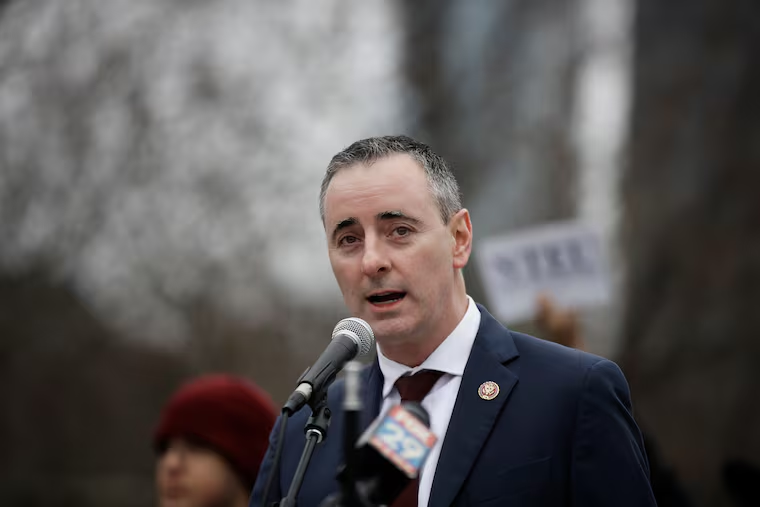U.S. House passes climate bill a day after Pa. legislators hold session skeptical of climate change
The U.S. House, lead by Democrats, approved a bill Thursday that would block President Trump from withdrawing from the Paris climate accord - just a day after Republicans in Pennsylvania held a research session with testimony from three scientists well-known for climate denial.

The Democratic-controlled U.S. House of Representatives approved a bill Thursday that would prevent President Donald Trump from pulling the United States out of the Paris climate accord and keep a pledge to reduce greenhouse gases. The action came a day after a Pennsylvania Senate committee held a research “workshop” with testimony from climate denialists.
The House bill gained support from local members of Congress, including Brian Fitzpatrick, who was one of only three Republicans to vote yes. Although the bill is not close to the scale of the Green New Deal being pushed by many Democrats, it marks the first real climate legislation approved by the House in a decade.
“Climate change must be addressed proactively with leaders from both sides of the aisle working to protect our planet. Every nation will be affected by climate change, which is why nearly every country agreed to work to reduce carbon emissions in the Paris climate accords," Fitzpatrick said. "The people in my district remain committed to pursuing bipartisan solutions to address climate change and protect our environment, which is why I voted yes on H.R. 9.”
Other Pennsylvania representatives voting “yes” include Democrats Dwight Evans, Brendan Boyle, Madeleine Dean, Mary Gay Scanlon, and Chrissy Houlahan.
The bill was approved by 231-190 and now goes to the Republican-run Senate, where it is likely to die. Trump has said he will veto the legislation if it reaches his desk.
The president pledged shortly after taking office in 2017 to pull the U.S. out of the Paris Agreement as soon as 2020. The White House calls the new bill “inconsistent with the president’s commitment to put American workers and families first, promote access to affordable, reliable energy sources and technologies, and improve the quality of life for all Americans.”
The 2015 Paris Agreement, signed in 190 countries, sought to cut greenhouse gas emissions by more than 25 percent below 2005 levels by 2025.
Most climate scientists consider climate change to be undeniable. The U.S. Department of Commerce’s National Oceanic and Atmospheric Administration states on its website: “Impacts from climate change are happening now. These impacts extend well beyond an increase in temperature, affecting ecosystems and communities in the United States and around the world.”
Thursday’s bill was backed by environmental groups, including PennEnvironment.
“We applaud the members of the Pennsylvania congressional delegation who are taking the existential risks of climate change seriously by voting yes on this bill," Flora Cardoni of PennEnvironment said in a statement. “Americans have been waiting a decade for congressional action on the climate crisis, and we have no more time to waste.”
The bill was dismissed by Republicans as political theater.
Louisiana Rep. Steve Scalise, the House Republican whip, said the bill would “wreck the economy” and cost as many as 2.7 million American jobs that would go to China, India, and other countries that do not have to meet goals under the Paris Agreement until 2030.
On Wednesday, Republicans kept up their attack on the scientific evidence that human activity is causing the planet’s decades-long warming trend. In Pennsylvania, the state’s Senate Majority Policy Committee held a workshop in Harrisburg at the request of Sen. Scott Martin, a Republican from Lancaster County.
Majority Policy Committee Chairman Sen. David G. Argall of Schuylkill County said the goal was to "have a civil conversation where we can all sit down, discuss the real facts on this issue and have a meaningful conversation as to where Pennsylvania stands in controlling its emissions as compared to other states while also discussing the larger picture of how the United States compares in controlling its emissions compared to other countries.”
The committee invited PennEnvironment, but the group balked, saying the agenda for the day appeared to stack the deck with climate-change skeptics. The three scientists who ultimately testified were David Legates, Joseph Bastardi, and Gregory Wrightstone.
Legates, a professor of climatology at the University of Delaware, is affiliated with the Heartland Institute, a conservative public policy think tank that counts the Charles G. Koch Charitable Foundation and General Motors as supporters. Wrightstone, a geologist, is listed as with the Heartland Institute. Bastardi, a television meteorologist, is a well-known climate-change skeptic.
David Masur, executive director of PennEnvironment, said in an email prior to the event: “The science on climate change is clear, and holding an event of this nature is the equivalent of holding a hearing on the health effects of smoking that has three doctors who would argue that smoking isn’t bad for your health and three others speaking to the well-researched science and data on smoking.”
But Sen. Scott Martin disputed the committee was trying to stack the deck. He noted that David Titley, of the Penn State Center for Solutions to Weather and Climate Risk, and John Wallister, of the PA Environmental Council, were also invited. Like PennEnvironment, Titley and Wallister both “dropped out at the eleventh hour dropped out at the eleventh hour, instead of coming to share their beliefs and data, no different than the other three,” Martin said in a email.
You can watch the full workshop here.